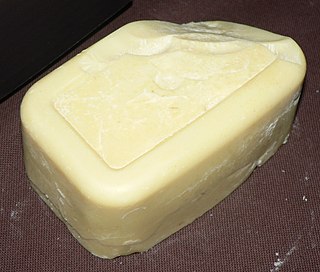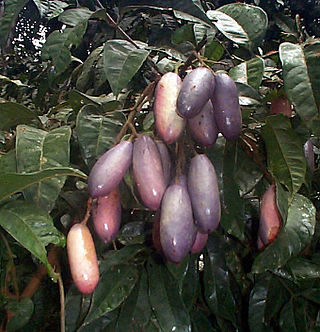
Palm oil is an edible vegetable oil derived from the mesocarp of the fruit of the oil palms. The oil is used in food manufacturing, in beauty products, and as biofuel. Palm oil accounted for about 36% of global oils produced from oil crops in 2014. Palm oils are easier to stabilize and maintain quality of flavor and consistency in ultra-processed foods, so are frequently favored by food manufacturers. On average globally, humans consumed 7.7 kg (17 lb) of palm oil per person in 2015. Demand has also increased for other uses, such as cosmetics and biofuels, creating more demand on the supply encouraging the growth of palm oil plantations in tropical countries.

Soap is a salt of a fatty acid used in a variety of cleansing and lubricating products. In a domestic setting, soaps are surfactants usually used for washing, bathing, and other types of housekeeping. In industrial settings, soaps are used as thickeners, components of some lubricants, and precursors to catalysts.

Vegetable oils, or vegetable fats, are oils extracted from seeds or from other parts of fruits. Like animal fats, vegetable fats are mixtures of triglycerides. Soybean oil, grape seed oil, and cocoa butter are examples of seed oils, or fats from seeds. Olive oil, palm oil, and rice bran oil are examples of fats from other parts of fruits. In common usage, vegetable oil may refer exclusively to vegetable fats which are liquid at room temperature. Vegetable oils are usually edible.

Vitellaria paradoxa, commonly known as shea tree, shi tree, or vitellaria, is a tree of the family Sapotaceae. It is the only species in the genus Vitellaria, and is indigenous to Africa.

Cocoa butter, also called theobroma oil, is a pale-yellow, edible fat extracted from the cocoa bean. It is used to make chocolate, as well as some ointments, toiletries, and pharmaceuticals. Cocoa butter has a cocoa flavor and aroma. Its melting point is slightly below human body temperature. It is an essential ingredient of chocolate and related confectionary products. Cocoa butter does not contain butter or other animal products; it is vegan.

Shea butter is a fat extracted from the nut of the African shea tree. It is ivory in color when raw and commonly dyed yellow with borututu root or palm oil. It is widely used in cosmetics as a moisturizer, salve or lotion. It is edible and is used in food preparation in some African countries. It is occasionally mixed with other oils as a substitute for cocoa butter, although the taste is noticeably different.

Baphia nitida, also known as camwood, barwood, and African sandalwood, is a shrubby, leguminous, hard-wooded tree from central west Africa. It is a small understorey, evergreen tree, often planted in villages, and known as osun in Yoruba.
Palm kernel oil is an edible plant oil derived from the kernel of the oil palm tree Elaeis guineensis. It is related to other two edible oils: palm oil, extracted from the fruit pulp of the oil palm, and coconut oil, extracted from the kernel of the coconut.

Backhousia citriodora is a flowering plant in the family Myrtaceae, genus Backhousia. It is endemic to subtropical rainforests of central and south-eastern Queensland, Australia, with a natural distribution from Mackay to Brisbane.

Ìlá Òràngún is an ancient city in Osun State, Nigeria, that was capital of an ancient city-state of the same name in the Igbomina area of Yorubaland in south-western Nigeria. Ìlá Òràngún is the more populous sister-city of Òkè-Ìlá Òràngún, located about 7.5 miles (12 km) to the north-east. The latitude and longitude coordinates of Ila Orangun are 8.019116 and 4.901962 respectively. According to the information obtained from GeoNames geographical database, the population of Ila Orangun in Osun State, Nigeria is 179,192.

Dacryodes edulis is a fruit tree in the Burseraceae family native to Africa. Its various regional names include safou, plum (Cameroon), atanga, ube, elumi (Nigeria), African pear, bush pear, African plum, nsafu, bush butter tree, or butterfruit.

Skin flora, also called skin microbiota, refers to microbiota that reside on the skin, typically human skin.

Crocodile oil is extracted from the fatty tissues of crocodiles. Crocodile fat is a product of commercial farming, evident in Thailand. Historically, for centuries crocodile oil has been used by traditional practitioners across the globe, including Chinese Traditional Medicine, Southeast Asia, Ancient Egypt. Crocodile oil was found to be used since the 19th century for different purposes in different cultures. Due to the oil's components, its richness in monounsaturated and Polyunsaturated fats, it is today commonly used as ointment for treatment of skin conditions, skin structure enhancement, collagen deposition, and medicine for illnesses. In recent times, the use of crocodile oil has invited criticism from the use of crocodile oil as there is an increased demand for cruelty-free and vegan-friendly beauty products in consumers of today's society.

Benin is predominantly a rural society, and agriculture in Benin supports more than 70% of the population. Agriculture contributes around 35% of the country's gross domestic product (GDP) and 80% of export income. While the Government of Benin (GOB) aims to diversify its agricultural production, Benin remains underdeveloped, and its economy is underpinned by subsistence agriculture. Approximately 93% of total agricultural production goes into food production. The proportion of the population living in poverty is about 35.2%, with more rural households in poverty (38.4%) than urban households (29.8%). 36% of households depend solely upon agricultural (crop) production for income, and another 30% depend on crop production, livestock, or fishing for income.

Aleppo soap is a handmade, hard bar soap associated with the city of Aleppo, Syria. Aleppo soap is classified as a Castile soap as it is a hard soap made from olive oil and lye, from which it is distinguished by the inclusion of laurel oil.

Vitellaria paradoxa is extremely important in Burkina Faso. Termed "women's gold" by Burkinabé villagers, the nuts of shea tree can be collected and processed by crushing and grinding to yield shea butter, which is widely used in soap and in cosmetics as a moisturizer, salve, or lotion. Shea butter is also edible and may be used in food preparation; it is sometimes used in the manufacture of chocolate. The bark of the tree is also used as an ingredient in traditional medicines and the shell of nut is said to be able to repel mosquitoes and is also said to protect existing trees.
Allanblackia oil is a vegetable oil that comes from the seeds of trees of the genus Allanblackia. This tree can be found in the wet tropical belt of Africa. Because of its unique blend of fatty acids, the oil from Allanblackia seeds has melting properties that make it excellent to use as structuring fat in food products, e.g. margarines.
Dudu-Osun is an African black soap made from herbs found in the Savannah and tropical rainforest regions of West Africa. Although the black soap was once only known to people of Yoruba descents. Dudu-Osun, a Nigerian variant of the soap is among the few brands making for wider acceptance and recognition for this beauty product in the mainstream industry.

Pentadesma butyracea is a tree native to the forests of tropical Africa from Sierra Leone to Cameroon. It has multiple uses, the main one being the manufacture of a kind of butter called "kpangnan butter" similar to shea butter. The timber is used in cabinetmaking and construction.















